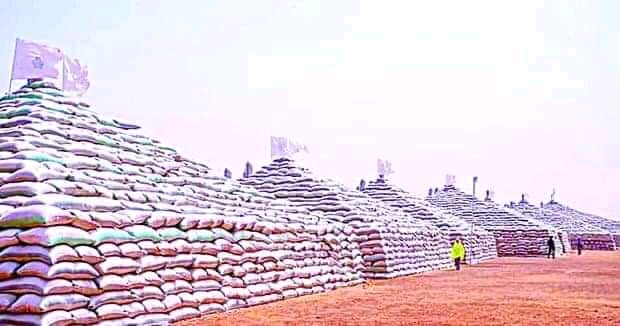
By Ibrahim M. Baba
The Rice Pyramid unveiled yesterday in Abuja has continued to generate anger and misinformed comments on Social Media. Some people out of ignorance or sheer mischief are angry seeing Rice pyramids in thousand bags, and have continued to give it different cynical interpretations in the name of tarnishing the good intentions of the federal government under the initiative.
What they don’t know however is that, the 1.2 million bag paddy rice pyramid was achieved through the Anchor Borrowers Programme initiated by the Central Bank of Nigeria. The aim of the program was to ensure food security agenda of the present administration which in turn would drive down prices of food items in the country.
According to the Governor of CBN, from a National paddy rice production of about 4.5 tons per annum before the Anchor Borrowers Program initiative in 2015, paddy rice production rose to over 9 million tons by last year. As at the end of December 2021, CBN had financed 4.5 million farmers that cultivated 5.3 million hectares across 21 commodities through 23 Participating Financial Institutions in the 36 States of the Federation and FCT.
This would definitely reduced if not completely stop Nigeria from total reliance on importation of rice from other countries. Thailand alone exported 1.3 million metric tons of rice to Nigeria in 2014, not to talk of India, China, Hungary and the rest. You can imagine how much Nigeria contributes to the growth of those countries every year through this importation.
Thus, President Buhari introduced the Anchor Borrowers Program in 2015 to curtail food import and that since then, Nigeria has witnessed incremental reductions in rice imports thereby saving us foreign exchange and helping preserve jobs in Nigeria. Through this initiative, Nigerian rice farmers have become richer than ever before.
The Anchor Borrowers’ Programme was designed to encourage investments in agriculture and empower smallholder farmers as drivers of transformation in the agricultural sector and as critical enablers of economic growth. So far, the CBN had invested over one trillion Naira in the Project and has achieved very much in terms of conserving foreign exchange, employment generation and food security in Nigeria.
As the President said, the Programme speaks loudly in its giant strides as it has increased access to finance by rural farmers, who before now were virtually excluded from the financial system. Through the Programme, federal government has so far supported over 4.8 million smallholder farmers across Nigeria for the production of 23 agricultural commodities including maize, rice, oil palm, cocoa, cotton, cassava, tomato and livestock.
Today rice production in Nigeria has increased to over 7.5 Million Metric tons annually. Prior to the introduction of Anchor Borrowers Program, the average production in Nigeria between 1999 and 2015 was less than 4 metric tons annually. The bags of paddy will be moving straight from here to rice milling plants across Nigeria, which leads to the release of processed rice to the markets by the rice millers. The measure will aid the efforts at reducing the price of rice in Nigeria.
Therefore, the Rice farmers under the aegis of Rice Farmers Association of Nigeria (RIFAN) decided to showcase themselves with rice pyramids. This is part of their appreciations to the Federal Government and of course to proof that the money they benefited from, had been efficiently itemized.
Why should this simple exercise give bad belle people red eye? Infact, one of the Newspapers in Nigeria captioned it, “rice pyramids in a valley of hunger”. Some other angry birds query why prices of rice remain high. Even PDP joined in mocking this rice pyramid. Not forgetting that under their Sixteen Years of misrule, Nigeria imports almost everything including simple matches and tooth pick.
The showcase of those pyramids is not for anything political, infact it was not even the idea of President Muhammadu Buhari. Rather, the RIFAN used the occasion to tell the
CBN that the program have really yielded positive results. Rice revolution is indeed possible, and Nigeria will surely het to the position of net exporter of rice in Africa and beyond.
Thus; the earlier we stop this cynicism and embrace commonsense, the better for us as a people. Otherwise we can never get the leadership we needed, because we will continue to mock and sabotage effort been put by our leaders in their quest to better our lives.
M.Baba writes this from Bauchi.
babamibrahim@gmail.com


